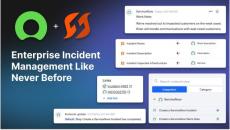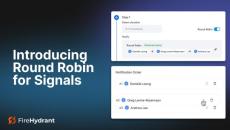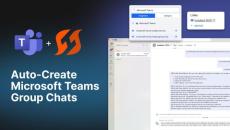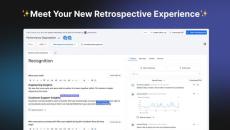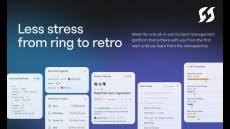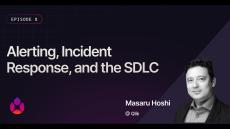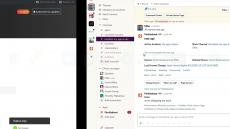|
By Danielle Leong
We built FireHydrant to be the kind of platform we’d want to use as developers, giving you the same tools and flexibility we rely on every day. With over 350 publicly accessible API endpoints, we’ve always believed in giving developers the power to customize and extend our platform to meet their exact needs.
|
By Jessica Abelson
We’re thrilled to announce that our ServiceNow integration is now generally available (GA). For enterprises that rely on ServiceNow to power their ITSM, this integration creates a seamless bridge between engineers responding to incidents in FireHydrant and the broader organization. At FireHydrant, we are committed to delivering enterprise-grade solutions that go beyond the basics.
|
By Jessica Abelson
Imagine this familiar scenario: it’s 2 a.m., and a critical service goes down. Your phone starts buzzing nonstop with alerts — all essentially saying the same thing. It’s overwhelming, distracting, and makes it that much harder to focus on fixing the problem. Enter Alert Grouping — it’s our smarter way to manage alerts, designed to help you cut through the clutter and focus on what matters.
|
By Jessica Abelson
At FireHydrant, we know that alert management is about more than just getting notifications to the right people — it’s about reducing stress and fatigue, balancing workloads, and empowering your team to respond with confidence. That’s why we’re excited to unveil Round Robin for Signals Escalation Policies, a feature designed to make alert escalations smarter, fairer, and more team-friendly by allowing you to automate the sequential assignment of new alerts.
|
By Jessica Abelson
When we launched our fully-featured Microsoft Teams integration in May, our goal was clear: to provide enterprise teams with the robust and comprehensive toolset they need to manage incidents faster and more effectively – right where they work. It’s all part of our commitment to building the leading enterprise incident management solution. Today, we’ve enhanced our Teams integration by adding the ability to automatically create Microsoft Teams group chats directly from your Runbooks.
|
By Jessica Abelson
Today, we’re excited to announce the release of our new ServiceNow integration in beta — designed to give engineers even more control to manage and automate incidents in FireHydrant while seamlessly keeping the rest of the organization aligned in ServiceNow.
|
By Jessica Abelson
At FireHydrant, we believe that what happens after incidents is just as important as what happens during – and that’s why Retrospectives have always been a cornerstone of our product. Today, we’re proud to introduce the most powerful, customizable, and collaborative retrospective experience you’ll find anywhere.
|
By Jouhné Scott
Milestones have been central to our platform since day one, helping users track incident progress and drive automation. We're excited to introduce our enhanced Milestone feature, offering unparalleled customization. Now, you can fine-tune your incident management process to perfectly align with your organization's specific policies and workflows.
|
By FireHydrant
The addition of Blameless' enterprise capabilities combined with FireHydrant's platform creates the most comprehensive enterprise incident management solution in the market.
|
By Robert Ross
Automated event payloads come in many shapes and sizes. These infinitely different event structures pose a problem for users who want to send them all to the same place to page on-call staff. Unless that on-call solution supports the schema directly, you’re out of luck. While we’re proud of the number of integrations we support today for event sources into on-call, we also think the best number that we should support is infinity.
|
By FireHydrant
Meet the only all-in-one incident management platform that is there with you from the first alert until you learn from the retrospective.
|
By FireHydrant
Engineers are bombarded with pages left and right. There's uncertainty about how to escalate. A constant blur exists between what's urgent and what can wait. This never-ending ping-pong game takes a toll. Burnout creeps in, and your engineering culture has taken a nose dive before you know it.
|
By FireHydrant
In this episode we chat with veteran cloud architect Masaru Hoshi about the challenges of alert fatigue, the importance of effective alerting systems, and fostering ownership in software teams. Masaru shares insights from his 30-year career, emphasizing the need for balance, trust, and collaboration in incident response.
|
By FireHydrant
In this demo we'll look at how FireHydrant can solve the pains of quickly declaring and managing an incident, all from Slack.
|
By FireHydrant
See how FireHydrant can help you achieve better reliability, get to resolution, and back to bed quicker.
|
By FireHydrant
FireHydrant is the only comprehensive reliability platform that allows teams to achieve reliability at scale by creating speed and consistency across the entire incident response lifecycle.
- January 2025 (3)
- December 2024 (4)
- September 2024 (1)
- August 2024 (1)
- July 2024 (2)
- May 2024 (2)
- March 2024 (3)
- February 2024 (4)
- January 2024 (1)
- December 2023 (3)
- November 2023 (3)
- October 2023 (6)
- September 2023 (3)
- August 2023 (4)
- July 2023 (4)
- June 2023 (5)
- May 2023 (6)
- April 2023 (4)
- March 2023 (6)
- February 2023 (2)
- January 2023 (3)
- December 2022 (3)
- November 2022 (3)
- October 2022 (3)
- September 2022 (1)
- August 2022 (4)
- July 2022 (2)
- June 2022 (5)
- May 2022 (4)
- April 2022 (5)
- March 2022 (4)
- February 2022 (4)
- January 2022 (2)
- December 2021 (1)
- November 2021 (1)
- October 2021 (3)
- September 2021 (6)
- August 2021 (3)
- July 2021 (1)
- June 2021 (1)
- May 2021 (7)
- April 2021 (3)
- March 2021 (4)
- February 2021 (4)
- January 2021 (4)
- December 2020 (2)
- November 2020 (2)
- October 2020 (7)
- September 2020 (5)
- August 2020 (2)
- July 2020 (6)
- June 2020 (6)
- May 2020 (1)
- April 2020 (4)
- March 2020 (2)
- January 2020 (3)
- November 2019 (1)
- October 2019 (2)
- September 2019 (2)
- August 2019 (2)
- July 2019 (1)
- June 2019 (3)
- May 2019 (7)
- April 2019 (2)
Utilize SRE best practices using FireHydrant’s incident response platform to organize, investigate, and remedy faster.
FireHydrant helps teams respond to service disruptions easily and effectively. By allowing teams to “rally the troops” with only a few clicks and assign incident roles to responders, responsibilities are quickly defined and allow people to focus on what matters: restoring service.
Organize, Investigate, Remedy and Prevent faster with FireHydrant:
- Teams: Fill out your SRE roles and assign members to instantly delegate responsibility in an incident. Assign who owns what components to get the right people on the job.
- Slack Integration: If you're using Slack, FireHydrant gets even better. Quickly open incidents, notify other channels, and assemble your team easily all without leaving Slack.
- The Service Catalog: Keep a catalog of your environments and the things running in them with our service catalog feature. Make it easy to quickly find all of the gears of your product.
- The Changelog: Fire's typically start when something changes. That's why we offer a one stop shop for you to log all of the change occuring in your stack.
- Incident Logs: While you're fighting a fire, FireHydrant will transparently keep track of changes and Slack chat in your incident log automatically. You can easily filter notes and chat as well.
- Post mortem: Easily access all prior incidents with fine grain filtering to help make actionable changes to keep your system robust.



